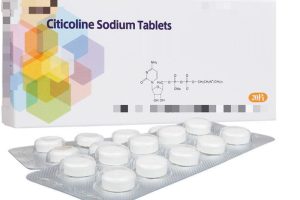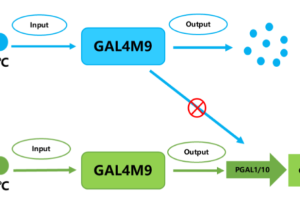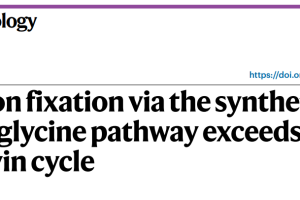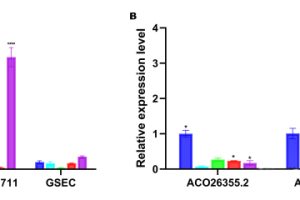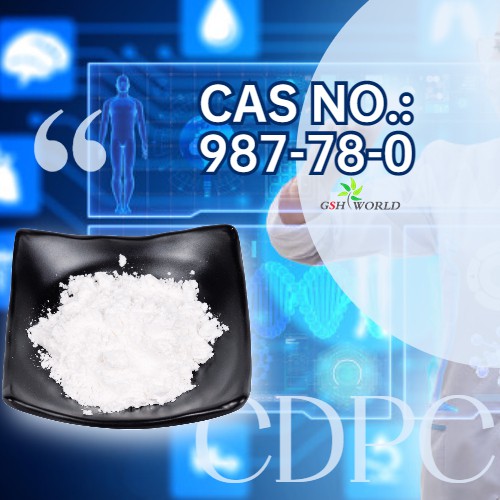Health popularization
Citicoline has been widely used in clinical practice, mainly for the treatment of neurological sequelae caused by craniocerebral injury or cerebrovascular accident, and has found new uses in clinical practice.
Its treatment in cerebral hemorrhage, Parkinson’s disease, glaucoma, diabetic peripheral neuropathy and tinnitus and other diseases has also attracted increasing attention.
So what is citicoline, what pharmacological effects, its indications (specific treatment of which diseases), efficacy and safety?
What is citicoline?
Citicoline is a single nucleotide composed of ribose, cytosine, pyrophosphate and choline. It is an endogenous nucleotide of the human body.
It is involved in many important metabolic pathways in the body. It is a natural precursor of phospholipid synthesis of neuron cell membrane structure and a precursor of biosynthesis of the neurotransmitter acetylcholine.
Citicoline is a neuroprotective agent that can protect vulnerable neurons, thereby reducing or preventing disease progression.
Currently, neuroprotective agents commonly used in clinical practice include calcium channel blockers, glutamate antagonists, free radical scavengers, and cell membrane stabilizers, among which citicoline belongs to cell membrane stabilizers.
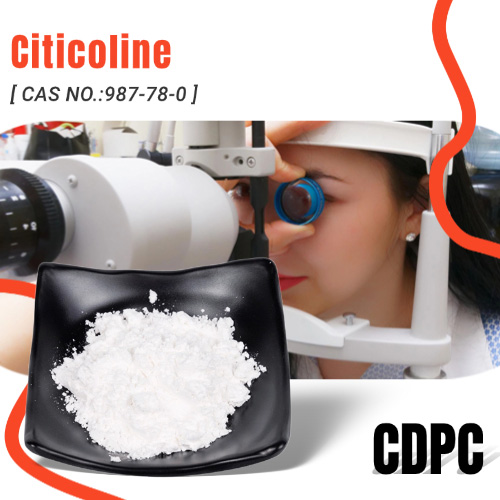
Pharmacological action of citicoline?
Multi-target pharmacological action of citicoline
1. Repair of neuron cell membrane
- 1, promote phospholipid synthesis, repair damaged neuron membrane and mitochondrial membrane
- 2, Inhibit the activity of phospholipase A1 and A2, reduce the decomposition of phospholipids, and block cell apoptosis
- 3, reduce the accumulation of free fatty acids, reduce lipid peroxidation
2. Stimulates the neurotransmitter system
- Increase the release of acetylcholine from cholinergic nerve endings
- Promote the activity of tyrosine hydroxylase and increase the synthesis of catecholamines such as dopamine and norepinephrine
- Inhibit the reuptake of the neurotransmitter (striatal synaptic dopamine)
3. Promotes energy metabolism in brain tissue
- Restore the activity of Na+-K+ -ATPase
- Increase glucose intake
- reduce the accumulation of lactic acid
- Increase cerebral blood flow
4. Alleviates the toxic effects of excitatory amino acids
Citicoline can stabilize the lipid raft carrying glutamate transporter protein and promote the clearance of glutamate from the synaptic gap, thereby reducing the excessive accumulation of glutamate extracellular and alleviating the toxic effect of excitatory amino acids.
5. Enhance neuroplasticity and promote nerve regeneration
Citicoline can increase the level of synaptic spines and synaptophysin, and enhance neuroplasticity.
Promotes neurogenesis in the dentate gyrus of hippocampus.
Citicoline has multi-target pharmacological effects, and these action mechanisms make it have significant potential in neuroprotection and nerve repair.
It has neuroprotection effect of blocking the occurrence of neuronal injury and nerve repair effect after the occurrence of neuronal injury, which broadens the therapeutic time window of citicoline.
What diseases can citicoline be used to treat?
Based on its pharmacological properties, citicoline is widely used in the treatment of stroke, cognitive impairment, traumatic brain injury, Parkinson’s disease, glaucoma, diabetic peripheral neuropathy, tinnitus and other diseases, and its efficacy and safety have been verified in multiple clinical studies, with sufficient evidence-based medical evidence.
1. Stroke:
Stroke is a kind of cerebral vascular blockage or rupture, resulting in brain damage of a class of diseases, including ischemic and hemorrhagic stroke, of which ischemic stroke is the main type of stroke, accounting for 75% to 90% of all strokes.
The lifetime risk of stroke in our population is 35%-40.9%, ranking first in the world, not only that, stroke is also the first cause of death and disability in our residents.
Clinical research evidence:
In 2002, the American Journal Stroke published a meta-analysis of clinical trials in patients with acute ischemic stroke, which showed that oral citicoline increased the likelihood of stroke patients recovering after 3 months.

In 2009, a drug monitoring study was conducted in South Korea for 4191 patients with acute ischemic stroke. The results showed that citicoline improved NIHSS score and BI score in patients with early and late treatment, and the long-term application benefit was greater.
The therapeutic effect was positively correlated with dose, and the improvement was more significant in the high-dose group (≧2000mg/ day). Long-term application safety tolerance.

A multicenter, randomized, double-blind, placebo-controlled pilot study of intracerebral hemorrhage suggests that citicoline is a safe drug for the treatment of intracerebral hemorrhage, with positive trends in efficacy.


An open-label, randomized, parallel study evaluating the effects of citicoline on post-stroke cognitive impairment showed that long-term use of citicoline significantly improved cognitive impairment in post-stroke patients.
2. Cognitive impairment:
Cognitive impairment refers to the abnormal brain advanced intelligent processing related to learning memory and thinking judgment, resulting in severe learning and memory impairment, accompanied by aphasia or apraxia or agnosia and other pathological processes.
Cognitive impairment can be caused by Alzheimer’s disease, cerebrovascular disease, systemic diseases, etc., according to the degree of mild cognitive impairment and dementia.
Clinical research evidence:
A meta-analysis of 7 studies, including Alzheimer’s disease patients, Parkinson’s disease patients with mild cognitive impairment, mild vascular cognitive impairment, and post-stroke cognitive impairment, suggested that citicoline has a positive effect on cognitive impairment induced by multiple etiology.
Results of an observational and prospective study using citicoline during a 12-month follow-up period showed that citicoline prevents cognitive decline in patients with cerebrovascular disease.
Results of a randomized, double-blind, placebo-controlled clinical trial show that citicoline significantly improves memory function in healthy older adults.

3. Head injury:
Craniocerebral injury is the mechanical deformation of the skull, meninges, cerebral vessels and brain tissues caused by external forces acting on the head.
Trauma can cause acute swelling, necrosis, cell disintegration, and structural disappearance of brain neurons. Later, due to tissue liquefaction, necrotic foci and glial scar formation, permanent nerve function deficit can be caused.
Trauma can also lead to lipid peroxidation damage, cellular calcium overload, tissue and cell cascaded damage, resulting in neurological function damage.
Clinical research evidence:
A meta-analysis showed that citicoline improved independence in patients with traumatic brain injury.
A secondary analysis of the COBRIT trial, which evaluated the recovery trajectory and long-term outcomes at 30, 90, and 180 days after injury, showed that citicoline had a favorable prognosis at 6 months follow-up.
Expert consensus recommends citicoline for the treatment of brain injury:
Expert consensus on neurological damage and repair in brain injury
Neurotrophic drugs: Trauma can lead to mechanical injury (primary injury) or ischemic hypoxic injury (secondary injury) of nervous tissue. The purpose of neuroprotection is to intervene in the “waterfall” cascade of tissues around the traumatic lesion or the ischemic “penumbra”.
It emphasizes “early” and “protection”, so it should be used within a 3-6h neuroprotective time window. Prevent nerve cells from developing irreversible damage.
4. Parkinson’s:
Parkinson’s disease is a degenerative disease of the nervous system.
The main cause of this disease is the degeneration and death of dopaminergic neurons in the substantia nigra, which may be related to genetic, environmental and other factors.
In China, there are 1,700 cases per 100,000 people over the age of 65, and the number of cases increases significantly with the increase of age.
At present, levodopa is the main drug in the treatment of Parkinson’s disease, but its long-term application will produce many adverse reactions.
Clinical research evidence:
- Citicoline can improve the symptoms of Parkinson’s disease.
- Citicoline can delay the use of levodopa in patients and reduce its dosage
5. Glaucoma:
Glaucoma is a type of disease that causes optic nerve damage and visual field loss due to increased intraocular pressure, and is also a specific neurodegenerative disease characterized by irreversible loss of retinal ganglion cells (RGC) and their axons.
Glaucoma is the second leading cause of blindness worldwide, second only to cataracts, and the first irreversible cause of blindness.
Clinical research evidence:
Results of a 10-year follow-up study of citicoline in glaucoma patients showed that citicoline can prevent the progression of visual field loss in glaucoma patients.

Results of an international, multicenter, randomized, placebo-controlled cross-over trial show that citicoline improves quality of life in patients with chronic open-angle glaucoma.

Based on the neuroprotection and neurorepair properties of citicoline, it is also often used in clinical studies of a variety of brain diseases and nervous system diseases to explore the therapeutic effect of citicoline in related diseases.
Citicoline has sufficient evidence-based medical evidence to support its application in the neurological sequelae caused by craniocerebral injury and cerebrovascular accident.
Some clinical studies have also shown the effectiveness of citicoline in the treatment of Parkinson’s disease, glaucoma, CO poisoning, neonatal hypoxic-ischemic encephalopathy and peripheral neuropathy.
Based on the multi-target neuroprotection and nerve repair effects of citicoline, it has a good application prospect in a variety of diseases caused by nerve injury.
Sum up
Citicoline is a kind of endogenous substance, long-term, sufficient application has better efficacy and safety tolerance;
It has multi-target pharmacological effects and is widely applicable to a variety of nervous system diseases.
It is helpful for nerve repair after injury, and can be used in early and late stages.
Citicoline is a neuroprotective agent with both neuroprotective and neurorepair effects. It has multiple guidelines, expert consensus recommendation, and sufficient evidence-based medical evidence.
reference
- [1]Dávalos A, Castillo J, Alvarez-Sabín J, et al. Oral citicoline in acute ischemic stroke: an individual patient data pooling analysis of clinical trials. Stroke. 2002 Dec;33(12):2850-7.
- [2]Cho HJ, Kim YJ. Efficacy and safety of oral citicoline in acute ischemic stroke: drug surveillance study in 4,191 cases. Methods Find Exp Clin Pharmacol. 2009 Apr;31(3):171-6.
- [3]Secades JJ, Alvarez-Sabín J, Rubio F, et al. Citicoline in intracerebral haemorrhage: a double-blind, randomized, placebo-controlled, multi-centre pilot study. Cerebrovasc Dis. 2006;21(5-6):380-5.
- [4]Alvarez-Sabín J, Ortega G, Jacas C, et al. Long-term treatment with citicoline may improve poststroke vascular cognitive impairment. Cerebrovasc Dis. 2013;35(2):146-54.
- [5]Bonvicini M, Travaglini S, Lelli D, et al. Is Citicoline Effective in Preventing and Slowing Down Dementia?-A Systematic Review and a Meta-Analysis. Nutrients. 2023 Jan 12;15(2):386.
- [6]Almeria M, Alvarez I, Molina-Seguin J, et al. Citicoline May Prevent Cognitive Decline in Patients with Cerebrovascular Disease. Clin Interv Aging. 2023 Jul 19;18:1093-1102.
- [7]Nakazaki E, Mah E, Sanoshy K, et al. Citicoline and Memory Function in Healthy Older Adults: A Randomized, Double-Blind, Placebo-Controlled Clinical Trial. J Nutr. 2021 Aug 7;151(8):2153-2160.
- [8]Secades JJ, Trimmel H, Salazar B, et al. Citicoline for the Management of Patients with Traumatic Brain Injury in the Acute Phase: A Systematic Review and Meta-Analysis. Life (Basel). 2023 Jan 29;13(2):369.
- [9]Puffer RC, Yue JK, Mesley M, et al. Recovery Trajectories and Long-Term Outcomes in Traumatic Brain Injury: A Secondary Analysis of the Phase 3 Citicoline Brain Injury Treatment Clinical Trial. World Neurosurg. 2019 May;125:e909-e915.
- [10]Acosta, J., Nombela, M., Palao, A., et al. Multicentre trial: Treatment of Parkinson’s disease with CDPcholine (citicholine). In: New trends in clinical neuropharmacology: Calcium antagonists, acute neurology, headache and movement disorders. D. Bartko, P. Turcáni, G. Stern (Eds.), John Libbey& Co. Ltd., London, 1988, 289-96.
- [11]Virno M, Pecori-Giraldi J, Liguori A, et al. The protective effect of citicoline on the progression of the perimetric defects in glaucomatous patients (perimetric study with a 10-year follow-up). Acta Ophthalmol Scand Suppl. 2000;(232):56-7.
- [12]Rossetti L, Goni F, Montesano G, et al. The effect of citicoline oral solution on quality of life in patients with glaucoma: the results of an international, multicenter, randomized, placebo-controlled cross-over trial. Graefes Arch Clin Exp Ophthalmol. 2023 Jun;261(6):1659-1668.
- [13]Salamah A, El Amrousy D, Elsheikh M, et al. Citicoline in hypoxic ischemic encephalopathy in neonates: a randomized controlled trial. Ital J Pediatr. 2023 May 12;49(1):55.
- [14] He Fuqi, Zhang Yang, Wang Weizan. Effect of hyperbaric oxygen combined with citicoline on acute CO poisoning [J]. China Journal of Coal Industry Medicine, 2019,27(2):128-136. (in Chinese)
- [15] The Yellow Sea Battle. Efficacy of mecobalamine and citicoline tablets in the treatment of elderly patients with type 2 diabetes mellitus and peripheral neuropathy [J]. Chinese Journal of Geriatric Medicine,2015,13(1):71-72.
- [16] Yao Wei, Li Tingmei. Clinical efficacy of citicoline sodium tablets in the treatment of facial neuritis [J]. Western Medicine,2010,22(6):1053-1054. (in Chinese)
- [17] Tong Juan, Ma Yonghong. Effect of hyperbaric oxygen combined with citicoline sodium on hearing level in patients with sudden deafness [J]. Shanxi Journal of Medicine, 2019,49(16):2138-2140. (in Chinese)



